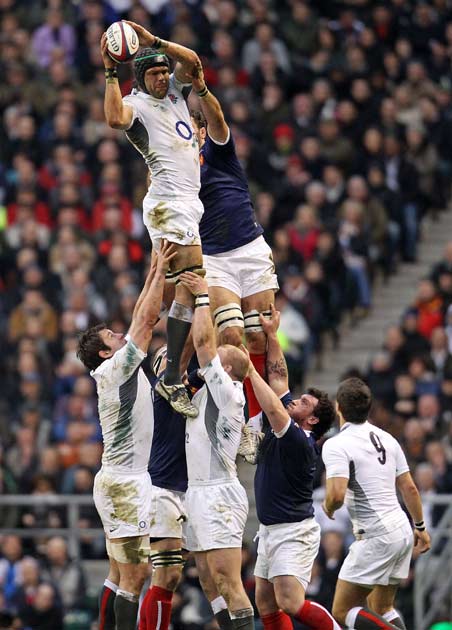Peter Bills: England's quick learners on course for Grand Slam

They say you always learn most, not from your victories but your mistakes. If that is true, England’s burgeoning rugby team took a quantum leap forward last Saturday at Twickenham.
In bright moments, golden instances that warm the soul and excite the eye, it might appear that England have completely mastered the nuances of this new game they have adopted this season, already incidentally with far greater success than any other international side in this part of the world.
How accustomed have we become to the sight of Chris Ashton flying in at the posts, ball tucked under an arm as he swallow dives for the ground? Or Ben Foden, that dashing young English full-back, dashing upfield with an elusive step and stunning pace carrying him into the heart of the opposition defence?
Yet for a long time at Twickenham last Saturday evening, a very different picture was being painted. England made some stupid mistakes that undermined the flow and continuity they sought. These were simple, basic errors even out of place on the training ground.
Even more worrying, their skills were exposed under the heavy pressure applied by the French. Suddenly, those who had seemed so comfortable with international rugby when offered space and time by the likes of Wales and Italy seemed less convincing.
At times, England lost both their shape and discipline in the face of a robust French defence that pressurised cleverly and put the onus back on the home team. What we saw in that situation was a whole lot less convincing than in the previous matches.
Moreover, in the initial stages, it was the French who seemed masters of the ball, true artists as opposed to plodding artisans. They hit the line at serious speed, like full-back Clement Poitrenaud who made one blistering run that offered the quintessential demonstration of how to take a pass at speed and create the maximum danger to a defence.
Poitrenaud had his defensive wobbles, he always does. But, with ball in hand and offered some room in which to attack, he remains a coruscating runner.
So all was doom and gloom for England? Not at all, and not just because they ended up ahead on the scoreboard. When you are building a team, a real squad of young men as Martin Johnson is attempting to do with England, you require far more evidence of progress, of true capability than numbers on a scoreboard.
England provided that evidence in the best way possible. They grew collectively as the match progressed and, best of all, they showed they could solve problems put in front of them by opponents on the field. This has always been the mark of good teams.
No side, whatever its pedigree, can always believe it will enjoy supremacy. Not even truly great, world beating teams like the Lions’ sides of 1971 in New Zealand and 1974 in South Africa could guarantee their superiority. They had to prove it on the field, time and again, and they did so by confronting difficulties and finding a way past them.
Hearteningly, England did this against the French last weekend. They worked through their problems to such an extent that they found a way to turn the tide, to put the pressure back on the French. And when it came to it, we saw that it was France, not England, who could not answer the questions posed of them.
In last weekend’s 6 Nations matches, we saw four poor sides, one strong side which fought hard but lost on the day and a potentially very good side. In the first cluster were Italy, Wales, Scotland and Ireland. France came next followed by England.
Alone of all the teams in this Championship, England have at last picked up the challenge laid down by the new law interpretations, proved they have the players to perform in such a way and gone out and achieved some good results by fine rugby. The French could play this way but don’t do so enough at club level for it to be natural.
As for Wales, Italy, Scotland and Ireland, they are frankly floundering. The matches in Rome and Edinburgh were technically dire, dreadful affairs with so many mistakes schoolboy teams would have been embarrassed. These countries seem to be going backwards, not forwards.
Of course, some resorted to that time-honoured practice; blaming the referee. It was true, Nigel Owens had a less than glorious day in Edinburgh on Sunday. But blame him for all the technical mistakes, the players offside at the breakdown, the hands in the ruck, the stupid acts of indiscipline? No, sorry, I don’t buy that.
Too many inferior players, me thinks, who aren’t good enough to play this new game to its potential – that is the real explanation.
Only England are showing themselves truly capable in that respect. And a Grand Slam beckons.......
Subscribe to Independent Premium to bookmark this article
Want to bookmark your favourite articles and stories to read or reference later? Start your Independent Premium subscription today.

Join our commenting forum
Join thought-provoking conversations, follow other Independent readers and see their replies